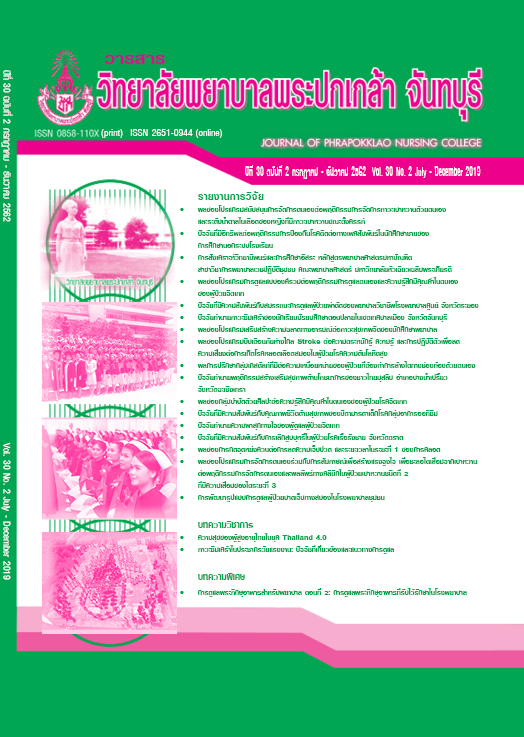The Effects of Holistic Caring Program on Self-care Behaviors and Self-esteem among Patients with Schizophrenia
Keywords:
Self-care behavior, Self-esteem, Holistic caring, Patient with schizophreniaAbstract
This quasi-experimental research aimed to examine the effects of holistic caring program on self-care behaviors and self-esteem among patients with schizophrenia. The samples included 24 patients with schizophrenia receiving services at Chao Phya Abhaibhubejhr Hospital, Prachinburi Province and were equally divided into an experimental group (n = 12) and a control group (n = 12). The research instruments comprised the holistic caring program, the Brief Psychiatric Rating Scale (BPRS), a questionnaire of demographic data, the self-care behaviors scale with the reliability of .81, and the self-esteem scale with the reliability of .83. The implementation and data collection were conducted from December, 2016 to March, 2017. Statistics used for data analysis included frequency, percentage, mean, standard deviation, independent t-test, and two-way repeated measures ANOVA with multiple comparisons by Bonferroni.
The research results revealed that 1) at post-test and 1-month follow-up period, the experimental group had statistically significant higher mean scores of self-care behaviors and self-esteem than the control group (p < .001); and 2) at post-test and 1-month follow-up period, the experimental group had statistically significant higher mean scores of self-care behaviors and self-esteem than the pre-test period (p < .001).
This research suggests that health care providers should apply this holistic caring program for promoting self-care behaviors and self-esteem of psychiatric patients and other patients with chronic disease.
References
กลุ่มงานจิตเวช โรงพยาบาลเจ้าพระยาอภัยภูเบศร จังหวัดปราจีนบุรี. (2559). รายงานผลการปฏิบัติงาน ประจำปี 2559. ปราจีนบุรี: ผู้แต่ง.
เนตดา วงศ์ทองมานะ. (2551). ผลของโปรแกรมจิตสังคมบำบัดต่อพฤติกรรมการดูแลตนเองของผู้ป่วยจิตเภท (วิทยานิพนธ์ปริญญามหาบัณฑิต). กรุงเทพฯ: จุฬาลงกรณ์มหาวิทยาลัย.
ปริวัตร ไชยน้อย. (2546). พฤติกรรมการดูแลตนเองของผู้ที่เป็นโรคจิตเภทที่กลับมารักษาซ้ำในโรงพยาบาล (วิทยานิพนธ์ปริญญามหาบัณฑิต). มหาวิทยาลัยเชียงใหม่.
ผ่องศรี ศรีมรกต. (2536). ผลของการให้คำปรึกษาแบบประคับประคองต่อการรับรู้ภาวะความเจ็บปวด ระดับความรู้สึกมีคุณค่าแห่งตน และขวัญกำลังใจในผู้ป่วยมะเร็งปากมดลูกที่ได้รับรังสี (ปริญญานิพนธ์ปริญญาดุษฎีบัณฑิต). กรุงเทพฯ: มหาวิทยาลัยมหิดล.
พรดุสิต คำมีสีนนท์. (2550). การฟื้นฟูสมรรถภาพทางจิตเวชในผู้ป่วยจิตเภทเรื้อรัง (วิทยานิพนธ์ปริญญามหาบัณฑิต). มหาวิทยาลัยขอนแก่น.
พันธุ์นภา กิตติรัตนไพบูลย์. (2540). ตราบาปและโรคทางจิตเวช. วารสารสวนปรุง, 13(1), 17-33.
ภุมมาภิชาติ แสงเขียว. (2542). การรับรู้การปฏิบัติหน้าที่ของครอบครัวและการปรับตัวของผู้ป่วยจิตเภท (วิทยานิพนธ์ปริญญามหาบัณฑิต). มหาวิทยาลัยเชียงใหม่.
มยุรี กลับวงษ์. (2552). การสร้างแบบประเมินพฤติกรรมการดูแลตนเองของผู้ป่วยจิตเภท (ปริญญานิพนธ์ปริญญาดุษฎีบัณฑิต). กรุงเทพฯ: มหาวิทยาลัยศรีนครินทรวิโรฒ.
มาโนช หล่อตระกูล, และปราโมทย์ สุคนิชย์. (บ.ก.). (2558). จิตเวชศาสตร์ รามาธิบดี (พิมพ์ครั้งที่ 4). กรุงเทพฯ: ภาควิชาจิตเวชศาสตร์ คณะแพทยศาสตร์โรงพยาบาลรามาธิบดี มหาวิทยาลัยมหิดล.
ระพีพร แก้วคอนไทย. (2551). การสอนทักษะการดูแลตนเองในผู้ป่วยจิตเภท (วิทยานิพนธ์ปริญญามหาบัณฑิต). มหาวิทยาลัยขอนแก่น.
วริศรา ใจคำปัน. (2550). ผลของโปรแกรมการเสริมสร้างพลังอำนาจแบบกลุ่มต่อการรับรู้สมรรถนะแห่งตนของผู้ดูแลผู้ป่วยจิตเภทที่มารับบริการที่แผนกผู้ป่วยนอก โรงพยาบาลสวนปรุง จังหวัดเชียงใหม่ (วิทยานิพนธ์ปริญญามหาบัณฑิต). มหาวิทยาลัยเชียงใหม่.
ศิริพร ทองบ่อ, อรพิน ยอดกลาง, สายทิพย์ สุทธิรักษา, อัจฉรา มุ่งพานิช, ไพลิน โพธิ์สุวรรณ์, ยุภาพร ยุระยาตร์, … รุจิรา จงสกุล. (2542). ประสบการณ์ชีวิตของผู้ป่วยจิตเภท. ใน เอกสารการประชุมวิชาการสุขภาพจิตนานาชาติ ครั้งที่ 5 (น. 212). โรงพยาบาลจิตเวชขอนแก่นราชนครินทร์.
สมภพ เรืองตระกูล. (2545). ตำราจิตเวชศาสตร์ (พิมพ์ครั้งที่ 6). กรุงเทพฯ: เรือนแก้วการพิมพ์.
สุนันทา นวลเจริญ. (2553). ผลของโปรแกรมการส่งเสริมการรับรู้สมรรถนะแห่งตนต่อความสามารถในการดูแลบุคคลที่พึ่งพาของผู้ดูแลผู้ป่วยจิตเภท (วิทยานิพนธ์ปริญญามหาบัณฑิต). กรุงเทพฯ: จุฬาลงกรณ์มหาวิทยาลัย.
อนงค์ ธรรมโรจน์. (2542). การใช้รูปแบบการฟื้นฟูสมรรถภาพตามสภาพปัญหาและความต้องการของผู้ป่วยจิตเวช โรงพยาบาลพระศรีมหาโพธิ์ (รายงานผลการวิจัย). อุบลราชธานี: โรงพยาบาลพระศรีมหาโพธิ์.
อุรา ทิพย์ประจักษ์. (2547). พฤติกรรมการดูแลตนเองของผู้ที่เป็นโรคจิตเภทที่จำหน่ายจากศูนย์ฟื้นฟูสมรรถภาพห้วยดินดำ โรงพยาบาลสวนปรุง (วิทยานิพนธ์ปริญญามหาบัณฑิต). มหาวิทยาลัยเชียงใหม่.
เอื้อญาติ ชูชื่น, สุกิตา วิรุณ, และวิมล นุชสวาท. (2557). ผลของโปรแกรมกลุ่มบำบัดต่อความรู้สึกมีคุณค่าในตนเองของผู้ป่วยจิตเวชเรื้อรัง. วารสารการพยาบาลจิตเวชและสุขภาพจิต, 28(3), 13-25.
Baker, C. (1995). The development of the self-care ability to detect early signs of relapse among individuals who have schizophrenia. Archives of Psychiatric Nursing, 9(5), 261-268.
Chou, K. R., Liu, S. Y., & Chu, H. (2002). The effects of support groups on caregivers of patients with schizophrenia. International Journal of Nursing Studies, 39(7), 713-722.
Corring, D. J., & Cook, J. V. (2007). Use of qualitative methods to explore the quality-of-life construct from a consumer perspective. Psychiatric Services, 58(2), 240-244.
Dickerson, F. B., Parente, F., & Ringel, N. (2000). The relationship among three measures of social functioning in outpatients with schizophrenia. Journal of Clinical Psychology, 56(12), 1509-1519.
Draine, J. (1997). The image of madness: Attitude toward psychiatry, psychiatrist and psychiatric treatment. London: Karger.
Kennedy, M. G., Schepp, K. G., & O’Connor, F. W. (2000). Symptom self-management and relapse in schizophrenia. Archives of Psychiatric Nursing, 14(6), 266-275.
Knapp, M., Mangalore, R., & Simon, J. (2004). The global costs of schizophrenia. Schizophrenia Bulletin, 30(2), 279-293.
Lindstrom, E., & Bingefors, K. (2000). Patient compliance with drug therapy in schizophrenia. Economic and clinical issues. PharmacoEconomics, 18(2), 106-124.
Muhlenkamp, A. F., & Sayles, J. A. (1986). Self-esteem, social support and positive health practices. Nursing Research, 35(6), 334-338.
Orem, D. E. (1995). Nursing: Concept of practice (5th ed.). St. Louis: Mosby-Year Book.
Polit, D. F., & Hungler, B. P. (1999). Nursing research: Principles and methods (6th ed.). Philadelphia: J. B. Lippincott.
Sadock, B. J., & Sadock, V. A. (2000). Comprehensive textbook of psychiatry (7th ed.). Philadelphia: Lippincott Williams & Wilkins.
World Health Organization. (2006). The ICD-10 classification of mental and behavioral disorders: Clinical descriptions and diagnostic guidelines. Geneva: Author.
Ziedonis, D., Yanos, P. T., & Silverstein, S. M. (2007). Relapse prevention for schizophrenia. In K. A. Witkiewitz & G. A. Marlatt (Eds.), Therapist’s guide to evidence-based relapse prevention (pp. 117-140). Burlington, MA: Elsevier.
Downloads
Published
How to Cite
Issue
Section
License
Copyright (c) 2019 JOURNAL OF PHRAPOKKLAO NURSING COLLEGE

This work is licensed under a Creative Commons Attribution-NonCommercial-NoDerivatives 4.0 International License.
เนื้อความ ข้อมูล และรายการอ้างอิงที่ผู้เขียนใช้ในการเขียนบทความเพื่อลงตีพิมพ์ในวารสารวิทยาลัยพยาบาลพระปกเกล้า จันทบุรี ถือเป็นความคิดเห็นและความรับผิดชอบของผู้เขียน คณะผู้จัดทำวารสารไม่จำเป็นต้องเห็นพ้องด้วยหรือร่วมรับผิดชอบ
บทความที่ได้รับการลงตีพิมพ์ในวารสารวิทยาลัยพยาบาลพระปกเกล้า จันทบุรี ถือเป็นลิขสิทธิ์ของวารสารวิทยาลัยพยาบาลพระปกเกล้า จันทบุรี หากหน่วยงานหรือบุคคลใดต้องการนำส่วนหนึ่งหรือทั้งหมดของบทความไปเผยแพร่ต่อเพื่อวัตถุประสงค์ใด ๆ จะต้องได้รับอนุญาตจากบรรณาธิการวารสารก่อน



